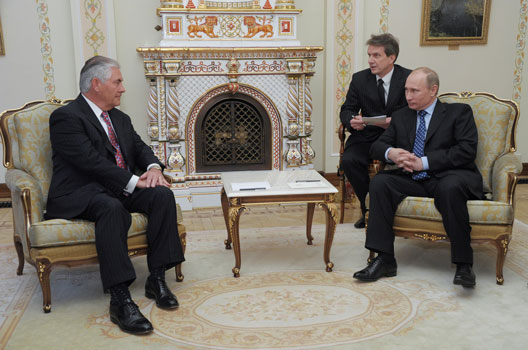 Russia dominated the Senate Foreign Relations Committee’s grilling of Rex Tillerson, whose views on the country have been the subject of much speculation. As chairman and chief executive officer of ExxonMobil, Tillerson had extensive business dealings with Russia. The senators used that experience at Tillerson’s confirmation hearing on January 11 to press US President-elect Donald Trump’s nominee for the job of secretary of state on whether he would consider Russian President Vladimir Putin a war criminal (no), his views on continuing sanctions on Russia (unclear), and support for Ukraine (yes). Nevertheless, we still know very little about Tillerson’s worldview when it comes to the US strategy toward Russia.
Russia dominated the Senate Foreign Relations Committee’s grilling of Rex Tillerson, whose views on the country have been the subject of much speculation. As chairman and chief executive officer of ExxonMobil, Tillerson had extensive business dealings with Russia. The senators used that experience at Tillerson’s confirmation hearing on January 11 to press US President-elect Donald Trump’s nominee for the job of secretary of state on whether he would consider Russian President Vladimir Putin a war criminal (no), his views on continuing sanctions on Russia (unclear), and support for Ukraine (yes). Nevertheless, we still know very little about Tillerson’s worldview when it comes to the US strategy toward Russia.
While in his opening remarks Tillerson said that he would have supported a stronger response to Russia’s aggression in Ukraine, including providing lethal weapons to Ukraine, this assertion was in reference to the situation in 2014 when the US Congress unanimously voted to pass the Ukraine Freedom Support Act months after the annexation of Crimea. It is unclear whether Tillerson’s support for a stronger response would extend to the current Russian aggression in eastern Ukraine.
Tillerson reaffirmed the legitimate security concerns of the United States’ NATO allies and called for Russia to be held accountable for its actions, but he stopped short of providing any specifics on what that would mean in terms of policy.
When pressed by senators on whether he would support sanctions against Russia (Exxon lobbied against sanctions when Tillerson was in charge, something he claimed to have no knowledge of), Tillerson’s position was less clear. He initially did not respond directly to New Jersey Democratic Sen. Bob Menendez’s question on whether sanctions are a useful tool, instead insisting that sanctions “by their design” harm American business with the “idea to disrupt American business engagement.” This response signaled that Tillerson is still wearing his businessman hat, rather than the hat of a diplomat. While this response may have been more of a gut reaction, given his forty years in the business sector, Tillerson will have to quickly learn that as secretary of state he will have to temper that instinct. As Menendez pointed out, diplomacy is not like a business deal.
Tillerson’s views on sanctions got more muddled as the hearing progressed. When pressed further on sanctions, he agreed that sanctions are a powerful tool of deterrence, but with the caveat that they should be carefully crafted and levied in concert with US allies. But when asked by Sen. Jeanne Shaheen (D-NH) if now was the right time to lift sanctions on Russia, given Russia’s mass human rights abuses and violations of international law, Tillerson’s reply was less satisfactory. He said that he would need more information on how to strategically engage Russia, preferring to “keep the status quo until we are able to develop what our approach is going to be.” He also gave himself a way out by qualifying his remarks to distinguish between effective sanctions (such as the ones that were imposed by the United States on Iran in response to the Islamic Republic’s nuclear program) versus ineffective sanctions, that can do more harm than good. The question left open is in which category would Tillerson put Russian sanctions? Presumably, the latter.
Tillerson demonstrated that he can take heat and keep a cool head, but after hours of questions the main takeaways are murky. We are left without a clear sense of what the Trump administration’s likely medium- or long-term strategy on Russia will be, if it will continue support for Ukraine, and how it would navigate relations with Russia in the Middle East.
Nevertheless, Tillerson did not make any glaring errors at his hearing, making it likely that he will win confirmation.
Alina Polyakova is deputy director of the Dinu Patriciu Eurasia Center and a senior fellow in the Future Europe Initiative at the Atlantic Council. You can follow her on Twitter @alinasphere.
Image: Then Russian Prime Minister Vladimir Putin and Exxon Mobil Chief Executive Rex Tillerson attend a meeting at the Novo-Ogaryovo state residence outside Moscow, Russia April 16, 2012. Picture taken April 16, 2012. (Sputnik/Kremlin/Alexei Nikolskyi via Reuters)
